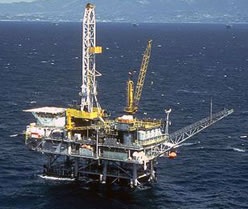
The Centre for Policy Analysis (CEPA) says it fears a sharp slowdown in non-oil GDP growth in 2012 if the third-quarter slump in the services sector is reaffirmed by revised estimates expected from the Ghana Statistical Service (GSS) later this year.
The GSS said last Wednesday that the services sector, which provides the largest chunk of GDP, shrunk by 2.2 percent year-on-year in the third quarter of 2012, slowing overall GDP growth to 1.7 percent.
“I’m very disappointed by the performance of the services sector. If these numbers hold, we’re likely to see non-oil GDP growth dropping very sharply,” said Dr. Joe Abbey, CEPA’s Executive Director.
“We thought that the non-oil sector would be growing at a minimum of 8.5 percent in 2012. Now it appears to be doing around 7 percent,” he added. Real non-oil GDP growth was 8.7 percent in 2011, according to the International Monetary Fund (IMF).
The CEPA boss said it is important to keep a “close eye” on developments in the non-oil sector, especially manufacturing, which could suffer most from the phenomenon known as the Dutch disease – where the oil sector squeezes out the rest of the economy by fostering a strong, uncompetitive exchange rate.
The GSS did not provide data on manufacturing, but said industry, which includes output from manufacturers, grew by 3.6 percent in the third quarter, down from 14.7 percent and 5.2 percent in the first and second quarters respectively.
Agriculture did relatively better, however, with a recovery of 4.6 percent following a 0.1 percent contraction in the second quarter. But only crop production contributed to the recovery, with the livestock, forestry and fishing sectors all contracting. In 2011, agriculture accounted for 26 percent of GDP and grew by a measly 0.8 percent.
The government has faced criticism for the slowdown in agriculture since the start of oil production in 2010, and as imports have skyrocketed within the same period some analysts, including Dr. Joe Abbey, have said this may be a sign of incipient Dutch disease.
President John Mahama, who refuted the claim during a presidential election debate last October, has promised to increase investments in agriculture and boost food production to maintain stable consumer inflation. Food-price inflation is currently at 3.9 percent, compared to non-food inflation of 11.6 percent and overall inflation of 8.8 percent.
The government also intends to maintain fertilizer subsidies for crops including rice, maize and cotton. Last year, it announced subsidies for 176,000 tonnes of fertilizer, estimated to cost GH?120.3 million and cutting the price farmers pay per bag by some 40 percent. Hope from Tullow data
Fourth quarter 2012 growth figures, which are expected later this year, may yet indicate an upturn for the economy, said Dr. Abbey after Tullow Oil Plc had reported a jump in oil production to 110,000 barrels per day in a trading statement to investors last week. Output had previously fallen to 63,000 barrels per day in the first half of 2012 due to problems with some wells.
“Tullow’s data should raise some hope because for now mining and quarrying growth, which includes the oil sector, is not that big,” he said.
The surge in oil production is seen as heralding a healthier outlook for the economy in 2013, with analysts forecasting GDP growth to be between 8 and 9 percent.